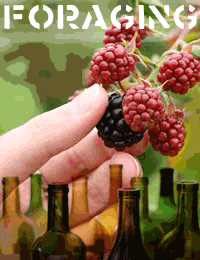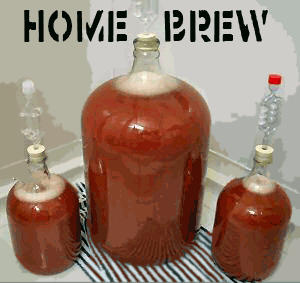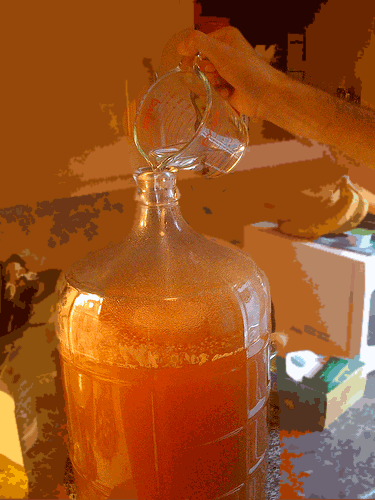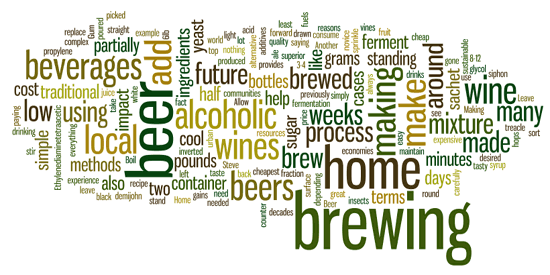I have been wine making and beer brewing for around two decades on and off. It goes without saying that making your own alcoholic beverages costs a fraction of the price of paying for it over the counter, and in many cases some of the ingredients can cost absolutely nothing if they are picked or foraged, whilst some can cost a couple of pounds. brewing beer and wine making in the home has gone on for thousands of years, it is only since industrialization has occurred that alcoholic beverages have been brewed on a huge scale outside of our communities.
Why should we make our own wines and beers?
 There are a great many reasons why people choose to brew their own alcoholic beverages, the first and most obvious is the fact this it is a lot cheaper, in many cases home brewed drinks can be of superior quality once the brewer gains some experience. When we make our own beers and wines, we are doing so by using the same methods by which they have always been brewed, modern brewing methods use a speeded up fermentation process, and some none traditional additives are used such as Gum Arabic, propylene glycol alginate and Ethylenediaminetetraacetic acid.
There are a great many reasons why people choose to brew their own alcoholic beverages, the first and most obvious is the fact this it is a lot cheaper, in many cases home brewed drinks can be of superior quality once the brewer gains some experience. When we make our own beers and wines, we are doing so by using the same methods by which they have always been brewed, modern brewing methods use a speeded up fermentation process, and some none traditional additives are used such as Gum Arabic, propylene glycol alginate and Ethylenediaminetetraacetic acid.
Are wine and Beer easy to make for the novice?
 Making wines and brewing beer can be as simple as you like, or a complex drawn out process depending on what sort of desired outcome you would like to see. Old traditional alcoholic beverages are a straight forward and simple process, for example to make mead you simply mix 3-4 pounds of honey into boiling water, let it cool down fill a demijohn with the mixture, stir tablespoons of lemon juice in and add a sachet of champagne or white wine yeast, and leave to ferment out for around 8-12 weeks.
Making wines and brewing beer can be as simple as you like, or a complex drawn out process depending on what sort of desired outcome you would like to see. Old traditional alcoholic beverages are a straight forward and simple process, for example to make mead you simply mix 3-4 pounds of honey into boiling water, let it cool down fill a demijohn with the mixture, stir tablespoons of lemon juice in and add a sachet of champagne or white wine yeast, and leave to ferment out for around 8-12 weeks.
 There is also an ale recipe that I made up myself which provides a cheap and tasty alternative to the beers made using expensive malts. Boil 120 grams of hops in a pressure cooker for ten minutes, then add 6lb of golden syrup, as this is the cheapest partially inverted sugar for home beer making, then add half a tin, or 220 grams of black treacle and continue to boil the mixture for a further 30 minutes on a low light.
There is also an ale recipe that I made up myself which provides a cheap and tasty alternative to the beers made using expensive malts. Boil 120 grams of hops in a pressure cooker for ten minutes, then add 6lb of golden syrup, as this is the cheapest partially inverted sugar for home beer making, then add half a tin, or 220 grams of black treacle and continue to boil the mixture for a further 30 minutes on a low light.
Allow the mixture to cool down, pour it into a brewing container, top up to 35 pint mark, sprinkle a sachet of brewers yeast on the surface and cover the container, it will take around 7-12 days to fully ferment out.Leave the brew standing for a further 3 days then carefully siphon off into bottles, if you add a teaspoon of sugar to each of the bottles the beer will be partially carbonate, giving it a head when its poured into a glass. Leave the bottled beer standing for at least two weeks before drinking it, if the beer is left to stand for 4 weeks its taste will improve.
For a low impact permanent culture of the future
In a future where everything we consume in terms of resources will need to be local to us, home made wines and beers can easily be produced at home, both in terms of growing the ingredients needed and brewing your brew. Home brewing in a low impact future will also regenerate local sustainable economies to replace that which was previously driven half way round the world and back again using fossil fuels. Another positive about local home brewing is the reintroduction of fruit vines and trees into the urban environment, bringing with them the capacity to help to sustain the pollinator families of insects that help to maintain our local Eco-systems.
Steve


Got Dandelion wine and Honey Mead on the go, great fun and not that expensive to set up 🙂